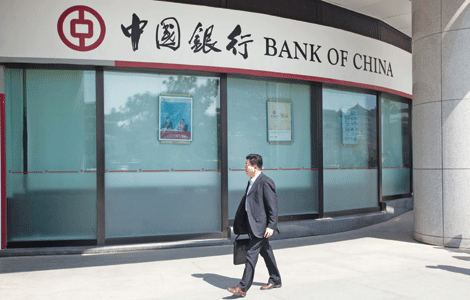Amount of bad loans may rise, says Deloitte
|
 A Bank of China Ltd branch in Beijing. According to data from the China Banking Regulatory Commission, the bad debt ratio of commercial banks was 1 percent by the end of last year. Nelson Ching / Bloomberg |
Weak property market and slow economic growth cited as causes
China's banks may see a moderate rise in the amount of non-performing loans this year as the property market weakens and economic growth slows, putting more pressure on the asset quality of lenders, according to a report from Deloitte China.
Loan defaults from companies in the real estate sector may be the biggest potential risk in 2012, because developers' financial condition is deteriorating while the government is unlikely to alter its policies to control the property sector in the short term, according to the report released on Thursday.
However, the loan risks to local governments' financing platforms will be "fundamentally under control", said the report.
According to data from the China Banking Regulatory Commission, by the end of last year, the total amount of commercial banks' non-performing loans had reached 427.9 billion yuan ($67.8 billion), 20.1 billion yuan more than that in the third quarter of 2011. The bad debt ratio was 1 percent.
"The number of non-performing loans is expected to slightly increase in the next two years, but it may not change a lot from last year's situation," said Wang Pengcheng, co-leader of Deloitte Global Financial Services Industry. He didn't give a specific prediction for 2012.
A forecast by Citic Securities indicated that the volume of Chinese banks' bad debt may increase by 5 to 10 percent during 2012, while the non-performing loan ratio will be less than 1.3 percent, amid the sluggish economic environment and falling profits.
"The possibility of a sudden outbreak of a bank debt crisis is very low as the risk control system is improving," said Guo Tianyong, director of the Research Center of the Chinese Banking Industry at the Central University of Finance and Economics.
Even if some projects may have difficulties repaying loans, the banks can temporarily take debt extensions to ease the repaying pressure, said Guo.
"But the tamed real estate market is expected to be the main threat to banks' profits in 2012," Guo added.
Deloitte's report said that an easing of the current property control policy is unlikely this year, while house prices may fall by 10 to 15 percent.
It said that although falling property prices may result in a fall in banks' profits, the influence of this would be limited.
By the end of last year, the total assets of financial institutions in the country's banking sector had reached 113.28 trillion yuan, with a growth rate of 18.9 percent year-on-year.
Commercial banks had a cumulative net profit of 1.04 trillion yuan in 2011, rising 36.3 percent year-on-year, according to the regulatory commission.
























